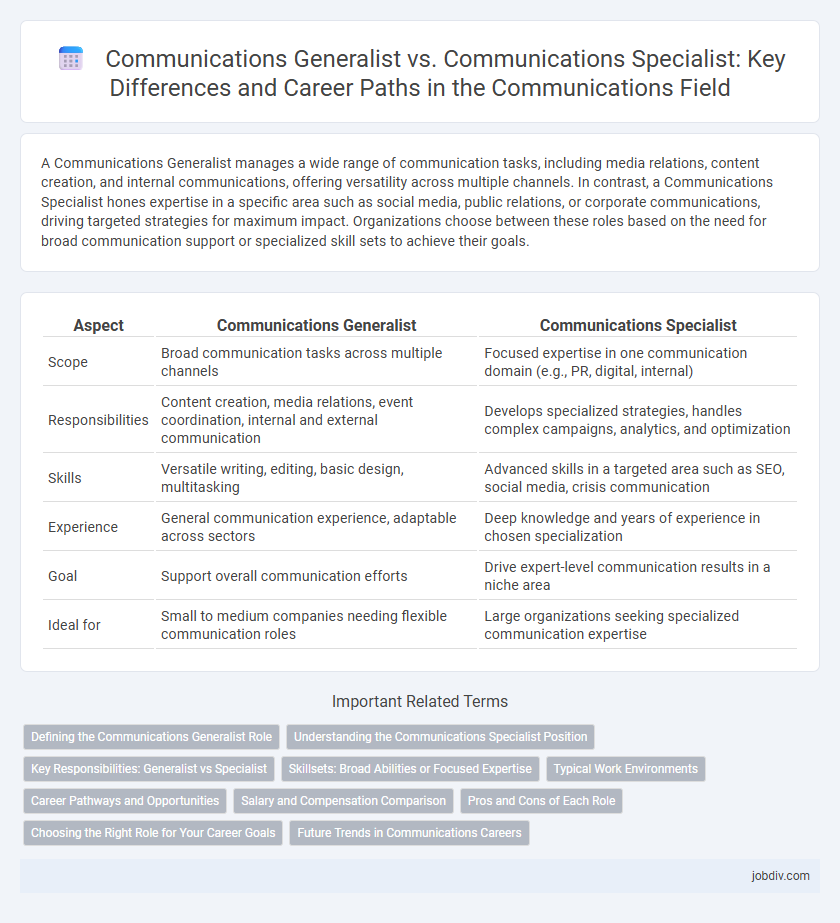A Communications Generalist manages a wide range of communication tasks, including media relations, content creation, and internal communications, offering versatility across multiple channels. In contrast, a Communications Specialist hones expertise in a specific area such as social media, public relations, or corporate communications, driving targeted strategies for maximum impact. Organizations choose between these roles based on the need for broad communication support or specialized skill sets to achieve their goals.
Table of Comparison
| Aspect | Communications Generalist | Communications Specialist |
|---|---|---|
| Scope | Broad communication tasks across multiple channels | Focused expertise in one communication domain (e.g., PR, digital, internal) |
| Responsibilities | Content creation, media relations, event coordination, internal and external communication | Develops specialized strategies, handles complex campaigns, analytics, and optimization |
| Skills | Versatile writing, editing, basic design, multitasking | Advanced skills in a targeted area such as SEO, social media, crisis communication |
| Experience | General communication experience, adaptable across sectors | Deep knowledge and years of experience in chosen specialization |
| Goal | Support overall communication efforts | Drive expert-level communication results in a niche area |
| Ideal for | Small to medium companies needing flexible communication roles | Large organizations seeking specialized communication expertise |
Defining the Communications Generalist Role
A Communications Generalist possesses a broad skill set encompassing media relations, content creation, social media management, and internal communications, enabling them to handle diverse communication tasks across multiple platforms. Unlike Communications Specialists who focus deeply on one area, Generalists adapt quickly to various communication needs, ensuring cohesive messaging and brand consistency. Their versatility makes them essential in dynamic environments where integrated communication strategies are critical for organizational success.
Understanding the Communications Specialist Position
Communications Specialists focus on expertise in specific areas such as media relations, content creation, or digital marketing, ensuring targeted and effective message delivery. They utilize advanced tools and analytics to tailor communication strategies that align with organizational goals and audience needs. Understanding this position involves recognizing its role in developing specialized skills to enhance brand reputation and stakeholder engagement.
Key Responsibilities: Generalist vs Specialist
Communications Generalists oversee a broad range of communication channels, including media relations, content creation, and internal communications, ensuring cohesive messaging across platforms. Communications Specialists focus deeply on specific areas such as social media management, public relations, or corporate communications, leveraging expertise to enhance targeted campaigns. The Generalist's key responsibility lies in versatility and adapting strategies across multiple functions, while the Specialist emphasizes depth and expertise within a focused communication domain.
Skillsets: Broad Abilities or Focused Expertise
Communications Generalists possess broad abilities across multiple channels, including writing, social media, public relations, and event planning, enabling versatile support in various communication tasks. Communications Specialists offer focused expertise in specific areas such as digital marketing, media relations, or internal communications, providing deep knowledge and advanced skills tailored to specialized functions. Organizations often balance these roles to optimize both comprehensive communication strategies and targeted messaging effectiveness.
Typical Work Environments
Communications generalists often work in diverse settings such as corporate offices, non-profits, marketing agencies, or government organizations, adapting to varied communication tasks. Communications specialists typically concentrate in environments related to their expertise, such as media outlets, public relations firms, or digital marketing teams, focusing on targeted strategies like social media management or press relations. Understanding these typical work environments highlights the flexibility of generalists and the focused expertise of specialists in the communications field.
Career Pathways and Opportunities
Communications generalists acquire a broad skill set across media relations, content creation, and digital marketing, enabling flexibility in various industries and roles such as corporate communications or public affairs. Communications specialists develop deep expertise in one area, like social media management or crisis communication, positioning themselves for senior roles or consulting opportunities within niche markets. Career pathways for generalists often lead to management roles overseeing diverse teams, while specialists typically advance towards thought leadership or strategic advisory positions in their focused disciplines.
Salary and Compensation Comparison
Communications specialists typically earn a higher salary than communications generalists due to their expertise in niche areas such as media relations, content strategy, or digital marketing. According to industry data, the average annual salary for communications specialists ranges from $55,000 to $85,000, whereas communications generalists earn between $45,000 and $70,000. Compensation packages for specialists often include performance bonuses and specialized training opportunities that reflect their targeted skill set.
Pros and Cons of Each Role
Communications Generalists offer versatility by managing diverse communication tasks across multiple platforms, making them ideal for dynamic environments but may lack deep expertise in specialized areas. Communications Specialists provide in-depth knowledge and refined skills in specific communication fields such as public relations or digital media, enhancing targeted campaign effectiveness while potentially limiting flexibility in broader communications roles. Choosing between these roles depends on organizational needs for either broad adaptability or focused proficiency in communication strategies.
Choosing the Right Role for Your Career Goals
Choosing between a Communications Generalist and a Communications Specialist depends on your career goals and skill set. A Communications Generalist offers broad expertise across multiple channels like media relations, content creation, and social media, ideal for those seeking versatility and adaptability. In contrast, a Communications Specialist hones deep knowledge in a specific area such as digital marketing or corporate communications, delivering targeted strategies and measurable results.
Future Trends in Communications Careers
Emerging trends in communications careers highlight the growing demand for versatile Communications Generalists who can manage diverse channels and adapt to multi-platform strategies. Communications Specialists are increasingly valued for deep expertise in areas like digital analytics, content strategy, and crisis management, aligning with technological advancements and data-driven decision-making. Artificial intelligence, immersive media, and personalized communication tools will further shape roles, emphasizing continuous learning and specialization within the communications field.
Communications Generalist vs Communications Specialist Infographic

 jobdiv.com
jobdiv.com